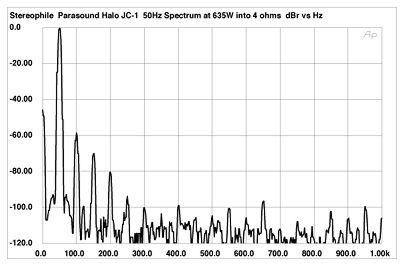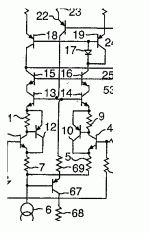Okay, many dips, but not as low as 0.3 Ohm, rather 1.5 Ohms (five times higher!).
Edmond, I quoted measurement results from some forum. It might be inaccurate.
for example KEF 104.2 has very flat impedance curve.I insist that it's the responsibility of the speaker manufacturer to avoid such dips
Please don't kill the
 craft of loudspeaker/amplifier matching
craft of loudspeaker/amplifier matchingandy_c said:
Maybe I'm missing something but can you explain why the distortion of this amplifier is so high at 50 Hz ?? I don't buy the "good sounding distortion" excuse. Why not eliminate it all together !!
regards
trev

It has only enough feedback to meet THX, that is all. I don't like to use feedback, and at 625W, trust me, your loudspeakers make even more distortion. Also, the Halcro should be making even more distortion, if it is still functioning, at that power level and measurement. Want to measure it and get back to me?
PS, anyone can make a low distortion amp at 50 Hz, it just takes an op amp and lots of feedback. It is at 10KHz, that it is more difficult. I should not have to explain this to an engineer.
PS, anyone can make a low distortion amp at 50 Hz, it just takes an op amp and lots of feedback. It is at 10KHz, that it is more difficult. I should not have to explain this to an engineer.
john curl said:It has only enough feedback to meet THX, that is all. I don't like to use feedback, and at 625W, trust me, your loudspeakers make even more distortion. Also, the Halcro should be making even more distortion, if it is still functioning, at that power level and measurement. Want to measure it and get back to me?
PS, anyone can make a low distortion amp at 50 Hz, it just takes an op amp and lots of feedback. It is at 10KHz, that it is more difficult. I should not have to explain this to an engineer.
I don't think the Halcro amps are just an opamp and lots of feedback. I think there is a bit more to them according to the patent description 😉
regards
trev
Scott, Scott, get up to speed. Feedback pairs on the differential input! Where have you been, or is the new stuff like this?
john curl said:After Otala, you then read what Barrie Gilbert had to say about the subject. Done that yet, oh engineers?
Yes, John, we have also read Barrie Gilbert's paper. You have also read more into that than exists, and indeed it DOES NOT support Otala's assertion that increasing NFB and decreasing OLBW worsens PIM. All Barrie Gilbert's paper shows (as does mine) that in the absence of PIM to begin with, the application of NFB DOES INDEED create PIM. No one, including myself,ever said otherwise. Read my paper; I show just how much it creates.
The point is two-fold:
Increasing NFB and/or decreasing OLBW, as long as CLBW is kept the same, does not worsen the amount of PIM created by NFB.
The second point is that most amplifiers start out with PIM in the open loop, before NFB is ever applied. There is strong eveidence that the application of NFB actually reduces this component of PIM.
You have never measured PIM on any amplifier, so what do you know?
You asserted that you did awhile back in this thread but, as usual, when pressed for details you did not answer.
Cheers,
Bob
john curl said:Trevor, have you analyzed the good, the bad, and the 'ugly' aspects of SMPTE IM?
First do it, and we can talk about Cordell's PIM measurement method.
John,
"Cordell's PIM measurement method" is a direct hardware implementation of Otala's prescribed method of PIM measurement, so if you have a problem with it, you need to look to Otala.
Bob
PMA said:I do not know why J.A. has always measured a 50Hz spectrum.
Hi PMA,
I'm glad he does measure 50 Hz THD because it often shows up unexpected distortion. Many believe that it should be easy to get low distortion at 50 Hz - in theory one would often expect lower distortion than at 1 kHz, since there is often the same or more NFB at 50 Hz. But other effects enter into the picture.
It looks like the JC-1 is putting out over 0.1% THD at 50 Hz at 625 watts. An interesting question is whether it is putting out that much distortion at 1 kHz. I bet it is not.
And yet, the JC-1 has 34 dB of NFB at low frequencies and 20 dB of NFB at 20 kHz, with an open-loop bandwidth of about 6 kHz if I recall. That would mean that the JC-1 NFB at 50Hz would be about the same as at 1 kHz.
So why would the 50 Hz THD be higher? I've seen this in other amplifiers reviewed as well. That is why it seems to me that the 50 Hz test is worthwhile.
Apparently, we cannot be complacent about 50 Hz THD to the point where we do not measure it.
High-power 50 Hz THD probably brings in some power supply effects, or maybe even thermal effects in the output stage. Remember, while the heat sink and package thermal time constants are lomg compared to 50 Hz, the die thermal time constant is definitely not.
Cheers,
Bob
john curl said:I do not agree with your opinion, Bob.
Which one?
As someone posted previously, it would be very helpful if you would include the quote of the post you are referring to in your post.
Anyway, whatever the opinion is that you disagree with, I am not surprised, but why don't you go into some detail in explaining why you disagree with it. We could all learn something if you would be specific and explain technically what the credible basis is for your disagreement.
Cheers,
Bob
john curl said:Bob, I am looking to both Otala and Mitch Cotter. You didn't try hard enough.
BS meter is pegged. Name-dropping is not a substitute for a technical comment.
Cheers,
Bob
- Home
- Amplifiers
- Solid State
- Matti Otala - An Amplifier Milestone. Dead or Alive
